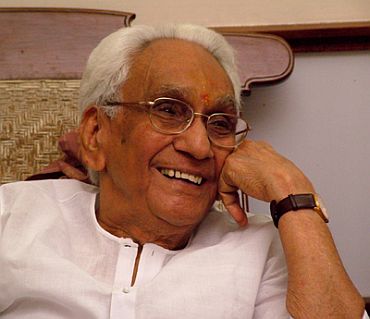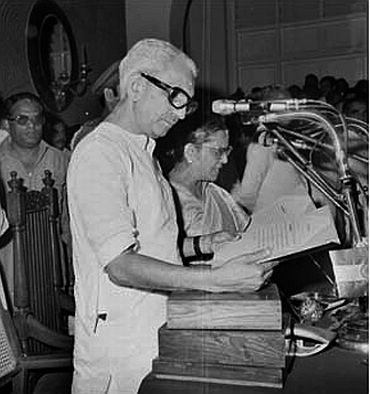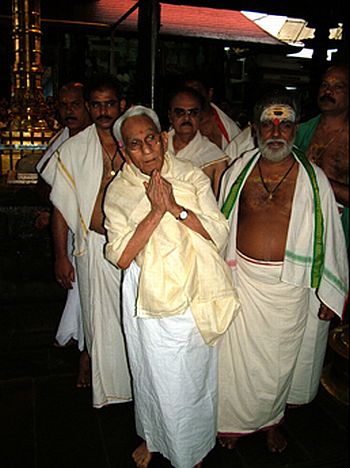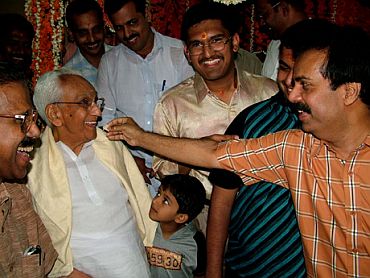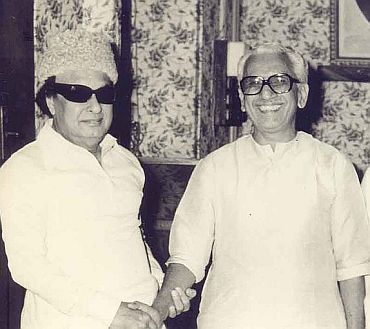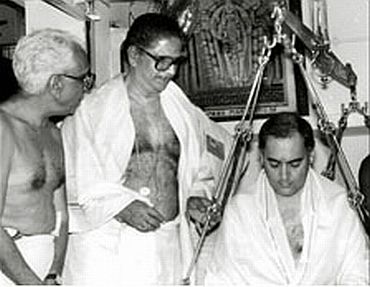 | « Back to article | Print this article |
Remembering the King of Kerala politics
Affectionately called 'Leader' by his admirers, Congress stalwart Kannoth Karunakaran was a master tactician who remained a 'King' in Kerala politics for decades and a political troubleshooter at the national level.
Considered a close lieutenant of former prime ministers Indira Gandhi and Rajiv Gandhi, the four-time former Kerala chief minister has been credited with creating in the 1970s a rainbow coalition -- the United Democratic Front -- that has sustained itself on the support from different social, caste and religious groups as a powerful bloc to take on the Communist Party of India-Marxist-led Left Democratic Front.
A former Union industries minister, the diminutive 93-year-old politician with a trade-mark hump and rasping staccato sentences had an amazing capacity for political survival except for brief breaks and showed no signs of let-up in ambitions even in his sunset years.
Kerala politics was his playing field
Initiated in politics in 1935 at the age of 19 when he became a member of the state Congress led by M Narayana Menon, Karunakaran, often criticised for apparent nepotism, first became chief minister on March 25, 1977.
Karunakaran, who has proved for decades that Kerala politics can still be his playing field, has often been accused of turning senile in his later years but he was not ready to say goodbye to his political career spanning over seven decades.
Even when he was in his late eighties, his political maneuvering was just as dexterous, mental agility just as remarkable and wit and sarcasm just as biting as ever.
A wily political player
An inscrutable political leader known for his steadfast devotion to Lord Krishna, the presiding deity at the famed Guruvayoor temple in Kerala, Karunakaran has always been a wily political player and, through sheer hard work and lots of luck, has donned a variety of roles -- as trade union leader, the Opposition leader, a Union minister and the chief minister.
He has been a Congress-I father figure who built the party 'from a group of nine MLAs in 1967' through two divisions in 1969 and 1978 to a strength of 57 legislators in the 1991 Congress-I-led UDF ministry. The big break in his career came in 1967 with the party choosing him to lead the nine-member Congress bloc after the party was humbled by the LDF.
When his colleagues pushed him out of power while he was serving as chief minister for the fourth time, it rankled him no end.
He faced allegations of nepotism and corruption
The feeling of being dispossessed has led him to seek revenge at every opportunity, inviting criticism from his opponents, who have accused him of trying to wreck the Congress in Kerala.
Karunakaran and A K Antony -- now the defence minister and a former chief minister -- were dubbed the political Tom-and-Jerry equivalents who ran each other in circles for over two decades, to the consternation of the state.
Karunakaran has been the chief minister of Kerala four times but completed his full five-year term only once -- from 1982 to 1987. All the four state ministries under him were tainted with allegations of nepotism and corruption.
He was an accused in the palmolein import scam
A key accused in the palmolein import scam, which has also sucked in current Central Vigilance Commissioner P J Thomas, Karunakaran as chief minister had decided to import 15,000 tonnes of palm oil at $405 per tonne from a Singapore-based firm whereas the prevailing market price was $392 per tonne.
He took charge as chief minister for the first time on March 25, 1977. However he tendered his resignation within a month, following certain references made by the Kerala high court in the Rajan case.
Rajan, an engineering student in Calicut who led anti-Emergency protests, was allegedly killed by the police at Kakkayam police camp.
Karunakaran served as the home minister from 1971 to 1977 in the ministry headed by C Achutha Menon.
Karunakaran on the warpath with Congress
Karunakaran took charge as chief minister again on December 28, 1981. However, this ministry did not last long. He resigned on March 17, 1982 following the withdrawal of support by a member of the Kerala Congress-M. Mid-term elections to the 7th Kerala Legislative Assembly was held on May 19, 1982.
The ministry with Karunakaran as chief minister assumed office on May 24, 1982 and continued till 1987. On June 24, 1991, Karunakaran took charge again as chief minister of Kerala for the fourth term, and resigned on March 16, 1995, making way for his bete noire Antony to take up chief ministership.
After Antony was elected as chief minister in 2001, Karunakaran was on the warpath with the government led by his own party and the party high command. After a series of unsuccessful attempts to regain supremacy in the Kerala wing of the Congress, the dissidents led by him landed up in the bad books of the Congress high command.
Karunakaran served in the assembly, Lok Sabha, Rajya Sabha
With the sharp increase in factional meetings held all over Kerala, mostly led by his son K Muraleedharan, Congress suspended Muraleedharan from the party. With Muraleedharan being pushed to the verge of political orphanage, Karunakaran left his party and formed a new political outfit with him as the president.
On May 1, 2005, Karunakaran formed a new party called Kerala National Congress (Indira). Later, the new party was renamed Democratic Indira Congress (Karunakaran). Later, Karunakaran merged his party with the Nationalist Congress Party, despite opposition from many senior leaders like T M Jacob, who has since left the party.
Karunakaran and his daughter Padmaja returned to their parent party (Congress) following a split. However Muraleedharan dissociated himself from his father and continued in NCP.
After the Mala assembly constituency in Thrissur district was formed in 1965, Karunakaran represented it continuously for 30 years. He has also been elected three times to Rajya Sabha and twice to Lok Sabha.
Karunakaran, who also took part in the freedom struggle, was born in a family of Ambalavasis (temple drum players) at Chirakkal in Kannur district on July 5, 1918. His father was a tahsildar in Kannur district.
He received formal schooling only up to Class VIII, reportedly because of an eye disease. He later won a diploma in design geometry and painting from a technological institute.
